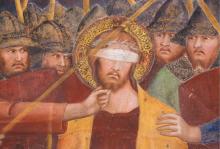Anabaptist/Reformed Discussion of The Politics of Jesus.
Commentary

Mary's words speak of the social revolution at the core of the gospel, here made clear from the first moments of the incarnation.

This is the homily delivered at his funeral by the General Secretary of the National Conference of Catholic Bishops.

One of the ever-present sights this bicentennial year has been the Declaration of Independence.

Ingmar Bergman’s newest film, Face To Face, documents the nervous breakdown of a highly disciplined and capable psychologist named Jenny.

“In such critical moments, our church knows instinctively its priestly and prophetic role,” said a south Korean church official to a visiting U.S. church delegation last month.

CIA Director George Bush, agreeing partially to the urgings of Senator Mark O. Hatfield, has informed him that the CIA will not take any initiative abroad requesting voluntary foreign intelligence information from American clergy and missionaries.

Nazi Germany seems to be the moral focal point of the 20th century, at least for the West.

A most obstinate misconception associated with the gospel of Jesus Christ is that the gospel is welcome in this world.

Individualism in our society, as I look at it today, is the greatest threat to an understanding of the church and the meaning of being a Christian.

Taxi Driver shows that the distinction between heroic and criminal killing is often tenuous and raises the question of what happens when America’s trained killers return home to find situations and people they like no better than those in Southeast Asia.

The Evangelicals: What They Believe, Who They Are, Where They are Changing. Edited by David F. Wells and John D. Woodbridge. Abingdon Press, 1975. $8.95.

The notion of a gentle, innocuous Jesus contradicts the notorious and turbulent events of Holy Week.

Evangelical songwriters John Peterson and Don Wyrtzen have come up with a musical for the bicentennial.

I say this not as a command, but to prove by the earnestness of others that your love also is genuine.

After a careful reading of early chapters in the Acts of the Apostles it seems unavoidably evident that the first Christian community, the Jerusalem church, was qualitatively the church in all its fullness.